Translations 677
Between You and I, Can There be Another?
Between You and I, Can There be Another?
With the social opening to the free development of sexuality, the existence of new love and relationships between couples is normal and is practiced nowadays
By Leyla M. Mancebo Bada, journalism student
digital@juventudrebelde.cu
Translated and edited by Walter Lippmann for CubaNews.

Open relationships are one of the many examples of love and relationships between couples practiced today Author: Taken from the Internet Published: 13/02/2020 | 07:25 pm
Isabel and Pedro have been dating for almost a year and say they are very much in love. They both showed up at a party, liked each other and then gradually got to know each other better. However, they do not have the traditional relationship of a couple, they “according to the current times and new trends of love”, as they defined it, they have an open relationship.
Yes, open. It is a relationship in which both can meet other people and its members have the freedom to have sexual or affective relationships with third parties, this without including their partner in them and respecting that the greatest source of affection and commitment is maintained in the closed bond of the couple.
They tell us that they are satisfied with their relationship, “there are no complaints, sometimes a little jealousy appears but it soon passes, and the best thing is the freedom to enjoy and live – in a safe and clear way – our spaces, they add. None of this means that there are less moments that we share together as a couple, on the contrary, explains Isabel.
And it is as the Spanish therapist Antonio Bolinches says, in an open relationship, both members agree that they can have other short or lasting relationships. But it is the primary couple that structures their affective life, and where love resides with a capital letter.
“Today there are many open couples,” explains Pedro. We young people experience a lot, and that lack of commitment is more interesting, it gives you more assurance that you won’t be hurt. Who knows, and one day we will no longer want to follow this trend and we will become official in the most traditional way, but in the meantime, we feel good about it”.
[To expand on the topic, listen to the Podcast: Open Couples, Does Love Die?], where JR’s radio show More Than Paper addressed the phenomenon. JR PODCAST: http://www.juventudrebelde.cu/cuba/2017-02-13/jr-podcast-parejas-abiertas-muere-el-amor
Photo: Taken from the Internet
This is just one of the many examples of love and relationships that are practiced today. With the great social opening to the free development of sexuality, it is normal that new definitions and ways of exploring human identity and personality exist.
Likewise, with the arrival of iconic dates such as February 14, known as Valentine’s Day or Valentine’s Day, a whole horde of references to love in its maximum expression is unleashed in society. And I wonder if in the post-modern era we can assume that love is only a matter of two?
Both the officialisation of the LGBTIQ+ community and the emergence of new consensual forms of stable relationships have given way to terms such as polyamory or open relationship. Where monogamous canons are abandoned in order to live love fully, according to the affective needs of each individual.

Polyamory, swingers…
Another very fashionable practice in these times are swinging couples, in which the members of two couples exchange their members for a defined and pre-established time. About this, Mileyda Menéndez Dávila, editor of the Sex Sense section of this newspaper, explains that these are not irresponsible orgies or tasteless youthful discargas (which also proliferate, sadly).
“In addition to the swinging encounters, there are mostly adults with happy marriages, people willing to oxygenate their erotic life without the disparate hypocrisy of infidelity or the renunciation of love cultivated in harmonious coexistence.
“There is a whole code of good conduct in these groups, which includes everything from protection against pregnancy and STIs to the essential reserve in terms of handling private information. One of their passwords is usually inscribed in large letters in the usual meeting places: NO is NO, to make it clear that individual freedom is inviolable in any circumstance” he says.
There are also polyamorous relationships. As the word indicates, it literally refers to many loves and is conditioned by the scientific fact that monogamy is not a question of genetics or inherent in the human condition, but is the product of the historical and social evolution of interpersonal relationships.
In practice, polyamorous relationships are those in which their members have a consensual right to maintain more than one love relationship, and in many cases their members share lifestyles, homes and even assume collectively the raising of children. One of the characteristics of these relationships is the commitment of all parties involved.

Photo: Taken from the Internet
For some, choosing someone exclusively, among so many, to lead an ordinary life is contradictory, because sexual and emotional interest occurs naturally towards more than one person. There are those who say that the main obstacle to enjoying this type of relationship is jealousy, but control of it is a question of acceptance and self-esteem.
All these terms, practices, modernities, or whatever they are called, show us that each individual lives in his own way and has the right to his intellectual and emotional growth, but the openness of the ways of thinking and feeling, helps to achieve empathy with our fellow beings, even when we do not share their practices.
When it comes to love, anything that enriches us without harming others is valid. If loving a person is beautiful and pleasant, and if we also agree to do it in a safe way, then between you and me, there can be one more.
Read also:
And do young people today still fall in love?
21st Century Couples
Love Speaks Through the Ears

Love Speaks Through the Ears
Two decades ago, love was born between Irela and Hugo while they were studying at the Universidad de Oriente. Their relationship became strong despite misunderstandings and prejudices, and today it can be told “on board” of cinemas, books and confessions
 By Liudmila Peña Herrera
By Liudmila Peña Herrera
digital@juventudrebelde.cu
Translated and edited by Walter Lippmann for CubaNews.

The dark room lights up with every jump of the stage on the big screen. When that happens, even from the back chairs, you can guess the romance. She, with her rebellious curly hair; he, too, with a cascade of hair that spreads across his back.
She whispers something in his ear; he nods without moving his eyes from the big screen. There is a sui generis complicity between these two lovers who whisper so much in their seats. They seem to talk more than they see. They roll the credits, turn on the light and there she is, squeezing her left hand and avoiding him to stumble in the crowd that comes out of the Santiago de Cuba cinema.
Her name is Irela Casañas Hijuelos, she studies Sociology and is not disabled. He is Hugo González Diéguez, future psychologist, and blind due to retinitis pigmentosa as a child. They are holguineros and live the hard 90’s at the Universidad de Oriente. When they can, they escape to the cinema or to a concert at the Sala Dolores.
“At that time Almodóvar’s films were released and she always described them to me.” Hugo speaks as if he were recalling passages from a life he is grateful for. Twenty-two years have passed, his hair is no longer long, but he does not forget Irela’s words in his ear: “They were those other eyes that are needed to enjoy a good work of art”.
What I like about you
When they met, Irela was starting her first year and Hugo was in third. They shared a taste for rock and literature, had common friends and met in the Peña de los Raros.
“The first qualities that attracted me to him were the freshness of his character, his positivity, his spirit,so warlike, but at the same time so ethical, generous, that he faced life with a lot of peace and courage. That’s why I began to admire him and the friendship began to turn into love. Without any kind of prejudice, he did not limit himself to telling me that he loved me. I didn’t limit myself either and let that be born.
He listens to her every word with patience, and assures us that he fell in love with “her sensitivity, her intelligence, her joy, and also her naturalness, her desire for knowledge and life experiences. He could not see her, and yet he saw her.
Love and the physical
It wasn’t love at first sight. Logically. Hugo had never even touched her to know what she looked like, but her voice and her personality bewitched him.
“Saint-Exupéry said that the essential is invisible to the eyes; that one can only see well with the heart. For me, above all, love is sympathy, a connection between two souls who find points in common. I liked her voice very much because it was pleasant and feminine, without resorting to subterfuge to please. And it is scientifically proven that smell is very important in attraction. That, and our affinities, were fundamental”.
Fears
Irela says no, that she was never afraid, that “it is society, with its hostile views and labels, that tells you, ‘Look, there is fear. You have to know it.” But I wasn’t afraid to let the relationship flow. It was something so natural, so beautiful, that we didn’t question anything and started to grow together, to enjoy each other.
Hugo, on the other hand, was afraid. But his was not the fear of others, of the questioning of others. He was afraid of the possibility of rejection. “When you care for someone very much, as I did for her, that’s what happens. It was very important that she accepted me and felt for me what I was feeling for her.
The acceptance
Irela was always a determined young woman, free as her curls, and judicious, confident. She cared about the acceptance of her own – who wouldn’t? – but that was not what would define the future of her relationship with Hugo.
“There was a little fear in my family, but when they realized that our relationship was very serious, that I was not going to give up, they began to accept my decision. Besides, with Hugo’s character, his authenticity and his noble and positive spirit, it is impossible not to admire him.
And they admired him. Or better yet, they admire him. Hugo is as grateful as he acknowledges his parents for never having been an obstacle: “I was always independent. They saw that step of mine as another sign of my way of being, and they supported me”.
Growing up together
At home, Irela reads you the subtitled films, and describes the visual works when they go to an exhibition. They almost always hang out together, except when she goes to La Mezquita publishing house, where she works, and he enters her office as a clinical psychologist at the Pediatric Hospital.
But what unites them most – besides love – are words. They both write. Their passion for literature is another bond, another link, and it has helped them to drive each other forward.
“I dedicated my first book to Hugo; although I read since I was a child, he helped me rediscover literature and start writing”.
Irela has published two books of poetry and one of essays. Some time ago she was a literary editor at Ediciones La Luz, and her professional experience has been vital to him as well: “Because of her work, she is an implacable critic of my texts when she has to be”.
Hugo published a book of poetry and has another one in the process of being edited. He says that Irela does not praise without reason. He knows her and she inspires him: “She is my fiercest critic and, at the same time, my best muse”.
Prejudice
“Many people have asked me, ‘Are you two brothers? They do not understand how it is possible that, with my disability, I have such a beautiful and intelligent woman. They also ask me if she is blind or visually impaired; but there is no doubt that, in the eyes of society, she is more exposed because she is a woman and because she does not have the disability.
Hugo’s reflection is sharp. For Irela, it certainly seems to have been more difficult: “I have suffered harassment from unknown men who have seen me with him and said unpleasant things to me. But what struck me most, at the beginning of my return to Holguín, was that some people, supposedly very liberal because of their cultural work, said indirect phrases to me that denoted prejudice; although it is important to clarify that we have always received many more signs of friendship than of prejudice”.
Everyday life, jealousy, trust
“We try to make everyday life not just mean staying alive, but that life is beautiful, diverse. Thanks to the support of his family, we have our own house, in which we share the housework. He, for example, likes coffee because it gives him the exact amount of sugar that we both like. I sometimes go a little overboard,” Irela accepts and laughs happily.
Hugo laughs too. And both confess that they try to read, enjoy an audio-commented film, and be surrounded by friends… but together, always together, without untimely jealousy, because “they show little confidence in themselves. We are not jealous and that security protects us. For me it’s not a problem that she can watch and that I don’t notice. I know what I am worth and how important I am to her.
Irela and Hugo
They walk the Holguin streets talking, laughing, waving… They go hand in hand looking for the shadow, if there is one. They transmit serenity, and also something unusual, difficult to translate with words, which perhaps has to do with their way of understanding life.
“We enrich the routine: I practice yoga and he does the Tibetan rites. Besides literature, he loves football: he’s a Real Madrid fan,” she says, and Hugo adds other ingredients to a love recipe they have been perfecting for more than two decades:
“Irela and I have built a couple without secrets. There is trust, respect and complicity. She’s not just my wife: she’s my partner, my accomplice. We love each other, but we are also friends.
And the confession brings them back to that Santiago cinema of his youth, where she narrated the film to him in a low voice while he felt that love spoke to his ear.
In the Name of Love

In the Name of Love
Granma joins the celebration for the Day of Love and Friendship, in which many men and women of this land defend the love of their hearts and that of their country
Author: Madeleine Sautié : madeleine@granma.cu
13 February 2020 23:02:05
Translated and edited by Walter Lippmann for CubaNews.

Photo: Dunia Álvarez Palacios
How do you write about love without the spirit of the poet being stamped on the white page? How do you touch it and say: “Hey, look, I’m writing, and you’ve crossed my mind, so you don’t leave me, so you’ve said everything.
“As if one could choose in love, as if it were not a lightning bolt that breaks your bones and leaves you staked out in the middle of the courtyard,” says the Cronopio major, preventing the advancement of the very letters that now seek to move aside that great of the Golden Age, which defined the greatest of feelings as “a carelessness that gives us care, / a coward with a brave name, / a lonely walk among people, / a love only to be loved.
The bard of swallows arrives at the round that is already forming: “The words of love will come back in your ears, / the burning words will sound, (…) as I have loved you…, disengage yourself, like this… they will not love you,” and the one who wrote the lyrical hexahedron sings: “Your love burst into my life like a gust through an open window.
“To suddenly know / that I was going to see her again, that I would have her / close, tangible, real, as in dreams. / What a contained explosion! / What a deaf thunder / rolling in my veins,” says the National Poet, just after the greatest of Cubans, in perfect rhyme, said: “I thought of you, and of your hair / that the world of the shadow would envy, / and I put a point of my life in them / and I wanted to dream that you were mine.
***
It is not always a peaceful stage where love verses nestle. Beyond their natural agitation, in very raw circumstances poems have been conceived, which as hymns deserve eternal deference.
Far from home and from his beloved, the Shepherd of Orihuela wrote, fighting Spanish fascism, his Song of the Soldier Husband:
“When I think of you on the battlefield, / my forehead that does not cool or appease your figure, / you approach me like a huge mouth / of hungry teeth. / Write me to the fight, feel me in the trench: / here with the rifle I evoke and fix your name, / and I defend your poor womb that awaits me, / and I defend your son.”
Like him, like the Salvadoran guerrilla who asked his beloved not to say her name when she knew of his death, many men and women today defend their love, that of their heart and that of their country, which is the greatest affection, in the most hostile environments. A world plagued by imbalance, subjugated by unreason, attempts against the happy destiny of men. May this day when love speak louder leave us for a few moments, not only to invoke peace, but to do what we must, in the name of love, for it.
Bolivia: Witch Hunt Against MAS…

Bolivia: Witch Hung Against MAS…
In addition to the disqualifications proclaimed by the Supreme Electoral Tribunal of Bolivia, there is a campaign in crescendo against the candidatures of the Movement to Socialism
Posted: Wednesday 12 February 2020 | 10:37:56 pm
 By Marina Menéndez Quintero
By Marina Menéndez Quintero
marina@juventudrebelde.cu
Translated and edited by Walter Lippmann for CubaNews.

Thousands of MAS followers proclaimed Arce and Choquehuanca in Sacaba, Cochabamba. Autor: Twitter Published: 12/02/2020 | 10:15 pm
The disqualification, on Tuesday, of 365 candidates for the seats in Congress – which will also be held in Bolivia on May 3rd – shows just the tip of a campaign against MAS that has already been launched from the violent, from the “legal”, and now muddies, as expected, the electoral panorama.
The lack of transparency and credibility will affect many. It is true that most of the candidates eliminated from the race did not belong to the Movement Towards Socialism (MAS). Most (205) are from the right-wing Front for Victory, which in October nominated Chi Hyung Chu – a Bolivian of Korean origin who, although distant from Evo Morales and coup leader Carlos Mesa, came as a surprise when he came in third place… (Let’s not forget that usurper Jeanine Añez is now also running, and has aspirations).
But the MAS has 57 people who have been disqualified. And although the impossibility of going on the ballot also extended to members of the very group that represents Añez (the Juntos alliance, with only nine ruled out). So it is obvious that the fundamental blow is against Evo’s party, which was first in the polls since the beginning of the polls and when Luis Arce had not yet been chosen as its candidate for president.
This is the political grouping that has had the greatest impact in deep Bolivia after 14 years of refoundation, and in spite of the misunderstandings of certain neglected sectors that today are allied with the oligarchy, or are victims of its manipulations the crowds that came to receive Arce and his running mate, David Choquehuanca, when they returned to Bolivia a few days ago, showed that support.
The vulgar “cut” of MAS candidates for senator and congress is being justified by the supposed absence of certain documents and other bureaucratic requirements. It’s an argument as little credible as it is scarce the confidence in a Supreme Electoral Tribunal replaced without reason by the coup plotters, and headed by a headline that was slected “by hand”.
First, they persecuted and imprisoned the best leaders of the Movement Toward Socialism; then they confronted them with false accusations, and now they are preventing them from running.
It is hard to believe that officials as lowly as those who seized power would allow a return of the MAS to the House of the People or the Palace of Quemado. In order to wipe out their management, they are dismantling the fruits of the model.
The “hunt” goes on for more. Luis Arce has been linked to an alleged embezzlement in the Indigenous Fund. It could be used to get him out of the game at the right time. All that would be needed is to make the charges official (everything about it is false!) and call him to trial, or lock him up?
Meanwhile, the campaign against Evo is spreading. Not only has he been charged with terrorism and sedition, charges sent to Interpol to circulate an arrest warrant, which that agency rejected.
The alleged request by social and popular organizations to prevent Evo from running for the Senate has become a recurring theme in the official media. The argument is that he does not meet the requirements either because “he lacks papers”. This is the same sword wielded against Arce so that he does not seek the presidency either, and against Diego Pary, the former foreign minister, so that he is not allowed to run for the upper house.
This Wednesday, the former candidate and coup leader Carlos Mesa – Evo’s contender in October and the one who proclaimed the false fraud that opened the door to the coup -, asked the Prosecutor’s Office to extend the investigation against Evo, and to include the former vice president, Alvaro Garcia Linera, and the former ministers Juan Ramon Quintana (a refugee at the Mexican Embassy), Carlos Romero and Hector Arce.
His ploy is to link them to alleged “electoral frauds” in light of the frustrated October elections.
There is everything in the vineyards of this Bolivia of falsified institutions. There may be even more if, as some fear, the worst machinations are yet to come.
Is Cuba Today Violent and Insecure?

Who Wants the World to Believe that a Climate of Insecurity and Violence Exists in Cuba?
The blockade causes shortages, consumption is affected, constant feelings of anxiety are created, counter-revolutionary media try to connect people to hate. We have been educated according to principles of humanism and justice. Hate does not build. Let us not be manipulated
Author: Raúl Antonio Capote | internacionales@granma.cu
February 12, 2020 23:02:52

The National Revolutionary Police have been involved on many occasions in returning items stolen from schools to students. Photo: Juvenal Balán
On Tuesday [February] 11, at 12:26 p.m., a message surfaced on the internet, arousing the interest of thousands of people. One Internet user wrote on Facebook: “I just saw something shocking”, and was moved to tell of the courageous and dignified performance of a National Revolutionary Police (PNR) officer. “Alone, against an enraged mob determined to lynch a rapist, she, with no other shield than her body, fulfilled her duty (…) to protect his life, so that justice would apply the law to him”.
At the time, hundreds of people shared and commented favorably on the message, and the video uploaded to his channel by the Guerrero Cubano (Cuban Warrior) YouTuber, which motivated the Internet user’s writing.
In the material of Guerrero Cubano, one could appreciate the determined and just action of our police on February 8, in Santiago de Cuba. Proceeding according to the law, she was carrying out the arrest of a person who was accused of having committed a monstrous crime: the rape of a girl under eight years old. Meanwhile, a group attacked the law enforcement officers who, in spite of the complex situation, never lost their cool and acted with great professionalism.
In the course of these events, calls to lynch, burn, destroy, and confront the police began to appear in the networks. Unscrupulous people, taking advantage of the pain of the victim’s relatives, friends and neighbors, called for chaos and accused the PNR and the government of “protecting” the rapist.
The crime, unusual in our Island, awoke the indignation and anger of the people, in a country where respect for children is an essence and not a slogan.
The calls to violence and disorder using digital networks, messages that appear with a certain degree of synchronization, of articulation, in the main media of the counterrevolution, cannot be a coincidence. They appear in the same media that supported the wrongly called “Clandestinos” who tried to stain the immaculate image of the Apostle of Cuba, José Martí. These were the same “false democrats”, the same mercenaries, seeking, through the manipulation of the sensibility of a case like this, to involve people in acts against themselves.
The mechanisms of chaos and violence
The economic war against the island is increasing, using the method of blaming the victim. As the precept of unconventional warfare says, one must try to “achieve the strange result that the victim not only does not complain, but ends up blaming himself for his misfortune and applauding the executioner.
The blockade causes shortages, consumption is affected, constant feelings of anxiety are created, counter-revolutionary media try to connect people to hate, to lie to them, to mobilize them, and to skillfully pull the strings of rancor to turn people into a time bomb.
They “prepare the ground” with the aim of provoking great mental confusion, in the face of the avalanche of facts, messages, and false news. “Citizens fall into such a state of regression that they cannot think rationally, nor protect their interests,” the CIA manuals say. In that state, many people are easily manipulated.
Not for nothing did the subversion plans in the Obama era not renounce economic warfare. On the contrary, the Genesis project, to cite one example, clearly explained that it was necessary to “rigorously maintain pressure on the economy, to force the government to negotiate from disadvantaged positions”. It was a mixture of cultural seduction and economic suffocation.
During the presentation of the draft resolution Necessity of ending the economic, commercial and financial blockade imposed by the United States of America against Cuba, in New York on 7 November 2019, Cuban Foreign Minister Bruno Rodríguez Parrilla, stated: “In recent months, the government of President Donald Trump has begun an escalation of its aggression against Cuba, with the application of unconventional measures to prevent the supply of fuel to our country Its aim, in addition to affecting the economy, is to damage the standard of living of Cuban families. The United States government is indeed responsible.
About 187 actions, including fines, sanctions and measures against the Cuban people, were taken in 2019 with the aim of generating hardship, dissatisfaction and an uprising against the government. This was rightly stated in Lester Mallory’s Memorandum in 1960, which proposed to provoke disillusionment and discouragement in the population in order to facilitate the overthrow of the Revolution.
They want to leave us without fuel for transportation without gas to cook our food, to paralyze the country, and to affect the daily life of the Cuban family in order to wrest political concessions from us. They need a lot of hatred, they need fear, they need to annul the judgment of the people, so that they act irrationally, to annul their psychological defenses, to destroy their self-esteem.
Cuba has been the object of a systematic campaign of motivational influence, pure and hard psychological warfare, fabricated in the laboratories of the CIA. Its goal has been to build a state of mind that will lead the people to act beyond all logic, one that will move them to execute aggressive actions, and to create a state of irrationality that can turn the human being into a beast. In that state, scientifically managed, they try to lead them to the achievement of the action desired by the manipulator.
As the ideologists of the Guarimbas, the Ukrainian Maidan, of George Soros and Gene Sharp, the “internationalist” Otpor boys, repeat over and over again: their aim is to make sure that nothing remains but chaos.
The narrative of indignation in the service of imperial plans
In Bolivia, gangs of criminals, under the guise of “popular indignation” over alleged electoral fraud, took control of cities, carried out roadblocks in the style of Venezuelan guarimberos, burned institutions, made threats, committed murders, tortured people on the streets, and humiliated social and political leaders.
The modus operandi is not exclusive to our region. In November 2019, Iran suffered a wave of violence that destroyed 730 banks, 70 gas stations, 140 government buildings and more than 50 security force bases.
Behind this perfectly-crafted scenario was the targeting of protests, the escalation of violence, and the use of criminal recruitment to attack the security forces.
In 2004, Otpor leaders Srdja Popovic and Slobodan Dinovic created the Center for Applied Nonviolent Strategy and Action (Canvas) in Serbia, an attractive and productive business financed by the US government.
The manual Nonviolent Struggle: 50 Crucial Points, became the “Bible” of the seditious and terrorist movements in Arab countries and Latin America, as much or more than the manuals of Gene Sharp, Bob Helvey and Ackerman, pioneers in the name of this strategy, and its precepts have been applied against Venezuela, Iran, Ukraine, Syria, Bolivia, etc.
Genesis, a project of ideological political subversion developed for Cuba, perfectly described this type of scenario: “Once the intentions of the movement are publicly declared, the highly committed activists are recruited, they move on to carry out street actions that generate repressive action by the security forces, in such a way as to create a state of ungovernability and chaos that justifies, always at the request of the Cuban people, United States intervention”.
What is raised on hate does not hold
Who is interested in making the world believe that a climate of insecurity and violence exists in Cuba? The Miami hate machine, the mud producer, which is profoundly anti-Martian, which is the same as saying anti-Cuban; which ignores an essential principle of the Apostle, everything that tries to rise above hate does not stand. Martí was a revolutionary without hatred, which is why he disagreed with “the barbarians who entrust everything to force and violence”.
The PNR acted in accordance with the law, in a country of laws that respect above all things the integrity of the detainee, a detainee who is not guilty until he is tried and sentenced. The PNR acted in accordance with the tradition learned from the founders of the nation, in accordance with a Revolution that tried war criminals, murderers who committed atrocious crimes, tortured and disappeared thousands of young Cubans. Batista’s torturers were not lynched, they were put on trial with all the guarantees of due process. That is how we acted then and that is how we will always act.
The person guilty of such an atrocious act will be tried and convicted, we have no doubt. We have been educated according to principles of humanism and justice that are the essence of the “sun of the moral world” to which we aspire. Hate does not build. Let us not allow ourselves to be manipulated.
Rape and stones in Santiago de Cuba. The whole truth. Cuba
Cuban Warrior T-3
1.68K subscribers
The networks have begun to manipulate an event that occurred in Santiago de Cuba, during the arrest of a subject with HIV who raped a girl under 8 years old. Hundreds of outraged people tried to attack him and the police fulfilled their duty to protect him. Some vandals took advantage of the situation to throw stones. #Cuba #Miami
TRANSLATION by Walter Lippmann for CubaNews.
Sanders Wins New Hampshire Primary

Bernie Sanders Wins New Hampshire Democratic Primary
Sanders showed his support among Democrats and took more than 25 percent of the vote
Author: Web Editor | internet@granma.cu
February 12, 2020 12:02:31
Translated and edited by Walter Lippmann for CubaNews.

Photo: Radio Havana Cuba
The Democratic primary left Bernie Sanders in New Hampshire as the winner today and turned around the result of the February 3 Iowa caucus, which gave an advantage to former South Bend, Indiana Mayor Pete Buttigieg.
Gone is the chaotic assembly of nine days ago, whose late delivery of results due to a computer error led to all sorts of criticism and suspicion of the Democratic Party.
In the New Hampshire election, Sanders confirmed his status as favorite among the Democrats and took more than 25 percent of the vote, while Buttigieg came in second place.
On his Twitter account, Sanders announced, “Our victory in New Hampshire is not about me. It’s about us. It’s about the movement our grassroots supporters, volunteers and donors built that will transform this country.”
Minnesota Senator Amy Klobuchar surprised the crowd and placed third in the vote count.
Only these three candidates earned delegates in this nomination contest to find President Donald Trump’s rival in November.
For a pre-candidate to get delegates, they had to win at least 15 percent of the vote,. This was a condition that was not met by, for example, Senator Elizabeth Warren, who did not get even 10 percent.
While the progressive Sanders led the Democratic presidential primary Tuesday, now former favorite Joe Biden suffered another major setback that now raises doubts about the viability of his campaign.
In the second nomination contest to find Donald Trump’s opponent, the former vice president was fifth, far behind the first choices and behind contenders such as Warren and Klobuchar. In Iowa, Biden had been fourth.
As if anticipating the disappointing result, Biden left New Hampshire and headed to South Carolina long before the results began to be known.
Biden, 77, did poorly in two previous presidential nominations before winning the 2008 election as President Barack Obama’s number two.
Now he hopes to stay afloat at least until the Feb. 29 elections in South Carolina and a series of contests in other southern states on so-called “Super Tuesday” of March 3.
Businessman Andrew Yang and Senator Michael Bennett dropped out of the race for the Democratic nomination, due to poor results in the Iowa caucus and New Hampshire primary.
Their withdrawal leaves nine Democratic candidates in the presidential race: Bernie Sanders, Pete Buttigieg, Amy Klobuchar, Elizabeth Warren, Joe Biden, Mike Bloomberg, Tulsi Gabbard, Tom Steyer and Deval Patrick.
(Prensa Latina)
Cristina Spoke About “Sincerely”

Cristina Spoke About “Sincerely” at the Havana Book Fair
Díaz-Canel joined the Argentine Vice President during the presentation of her book in Havana
By Marina Menéndez Quintero
February 8, 2020
Translated and edited by Walter Lippmann for CubaNews.
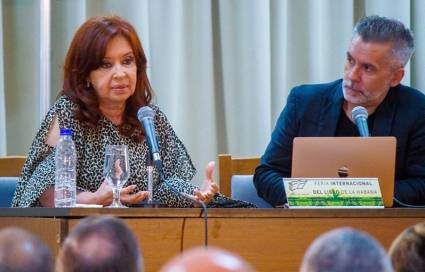
The presentation of Sincerely in Havana is the first that Cristina Fernandez has made outside of her country, and also the first in her capacity as Vice President Author: Maykel Espinosa Rodriguez Published: 08/02/2020 | 09:17 pm
A “crowd” of Argentines had been chanting for a few minutes: “Ya volvió, ya volvió” (He’s back, he’s back), among other songs, when one of Cristina Fernández’s compatriots suggested: “Uno cubano, uno cubano” (One Cuban, one Cuban). Then we heard: “Pa’ lo que sea, Cristina; pa’ lo que sea!” (Whatver you want, Cristina. Whatever you want!”)
Shortly thereafter, the former president and current vice president of Argentina burst into the crowded Nicolás Guillén hall of the Morro-Cabaña Complex, accompanied by the Cuban president, Miguel Díaz-Canel Bermúdez.
The preamble to a meeting that went beyond the mere formal presentation of a book could not be different, because Sincerely – her first volume of this type, and the one that precedes it with three others that compile speeches and texts – is much more than a strictly literary event and also constitutes, as the presenter Marcelo Figueras, an Argentine journalist, commented, a “political phenomenon”.
The text -a bestseller since its presentation in Argentina last April, welcomed with anticipatory warmth, the electoral results that would follow- was started by Cristina on the eve of the electoral transfer to Mauricio Macri, as she wanted to tell what had happened to her and to Argentina after that day.
She finished it in Cuba, where she finished writing the last chapter, started in the dining room of her house before coming to visit her daughter Florencia -sick from stress and cared for here, in March 2019-, which turned out to be, in the end, the first chapter of a book that, she clarified, is not an autobiography.
Combative as the passages that the author narrates and the greetings that she received were Cristina’s comments – although casual and often humorous – during the evening, led by colleague Marcelo with that professionalism shown when he asked the Vice President almost everything that each of the attendees would have liked to know.
In the case of the years of “Macri-ism”, they could not be left out of the book or the notes with which she explained its content, phenomena such as lawfare or the judicialization of politics, which she described as a special chapter of Latin America, but which acquired in Argentina a mafia and anti-family component, with the purpose of stigmatizing it.
It was no longer necessary to “disappear”, as the military did during the dictatorship against “dissident militants” of Latin American governments. This was replaced by media suppression through stigmatization, he explained.
In Argentina, after that dictatorship that began in 1976, a financial model came into place that indebted the country by more than ten billion dollars a year and tied it to the International Monetary Fund (IMF) until the arrival of Néstor Kirchner to the presidency, the development of an industrialization model and the payment that de-indebted the nation. For the first time Argentina, he noted, was not subject to IMF conditionality.
But with Macri came another period of indebtedness amounting to $30 billion per year, which left Argentina receiving the new administration with a debt of $44 billion to the IMF. “That was not by chance”, he said.
Cristina beieves that this should be a turning point and that the sovereign debt should be investigated, as a way to prevent the cycle from repeating itself, independently of the debt restructuring process initiated by the government of which it is part. “A point must be made. Never again,” he said.
She reaffirmed the position of the Frente de Todos and Alberto Fernández since the electoral campaign. You can’t pay if the country can’t grow economically, and you can’t grow if you don’t inject investment into the economy. The first thing we have to do to pay is to get out of the recession, he said.
Cristina Fernández gave a masterly lecture. And she gave it as she wrote: Sincerely.
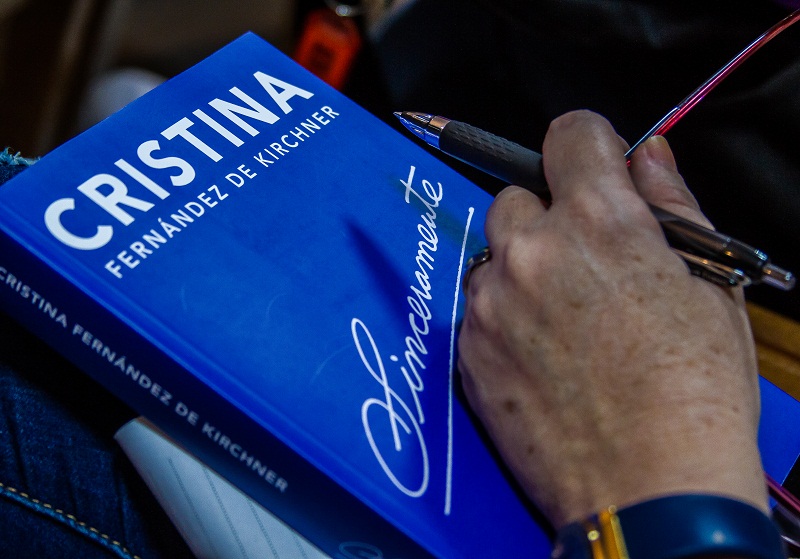
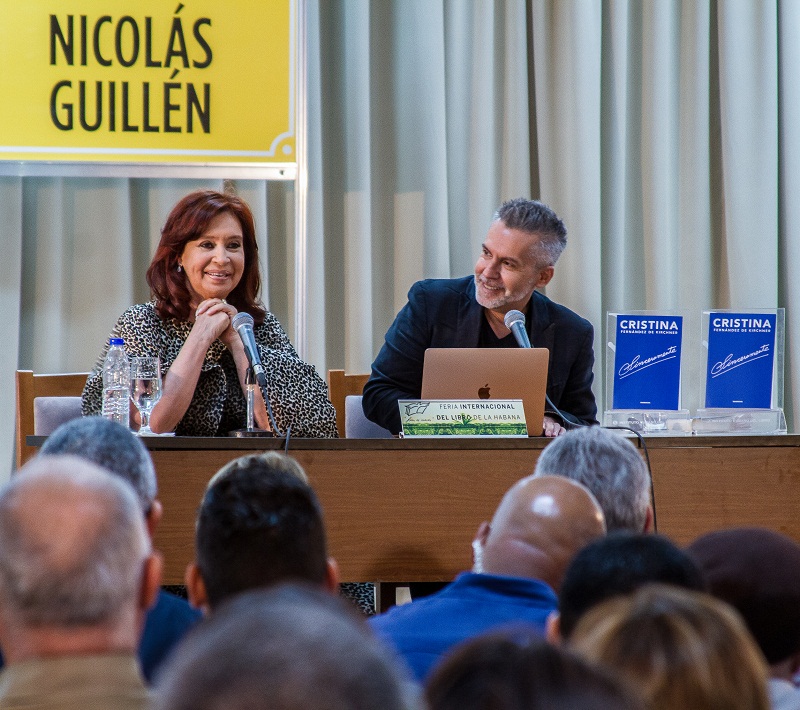
Cristina thanked the medical attention received in Cuba by her daughter Florencia, and had words of recognition for the health professionals of the Island. Photo: Maykel Espinosa Rodríguez
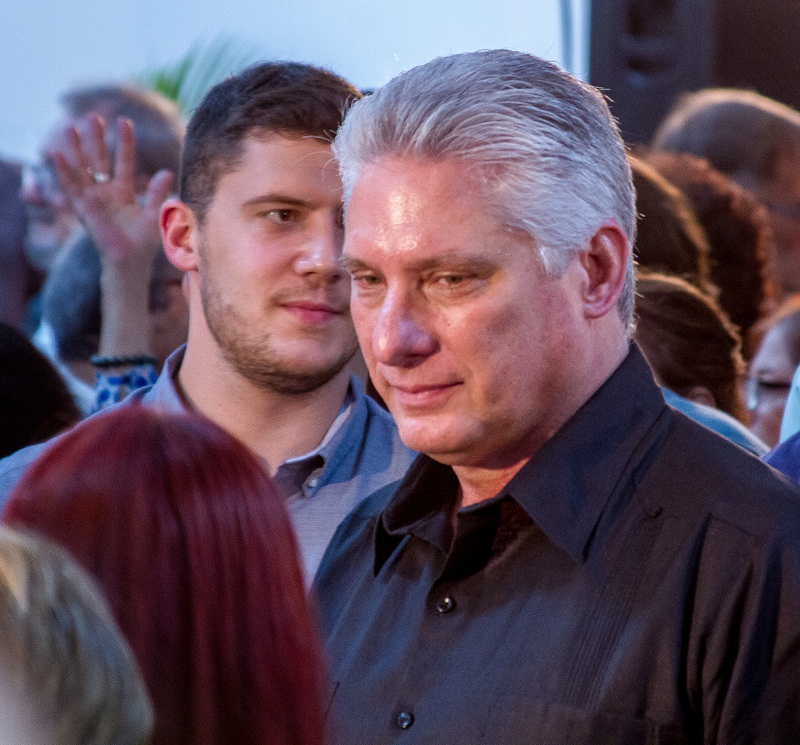
The President of Cuba, Miguel Díaz-Canel, attended the interesting evening together with intellectuals and the general public of the Island, as well as Argentinean visitors to the Fair. Photo: Maykel Espinosa Rodríguez
FULL VIDEO
We Ask Forgiveness of the Cuban People

We Ask Forgivness of the People of Cuba for What Our Government is Once Again Doing
A delegation composed of more than 50 Americans and called by the organization Code Pink, conducted an intense program of visits to communities in order to talk with the Cuban people.
by Nuria Barbosa León | internet@granma.cu
February 7, 2020 22:02:02
Translated and edited by Walter Lippmann for CubaNews.
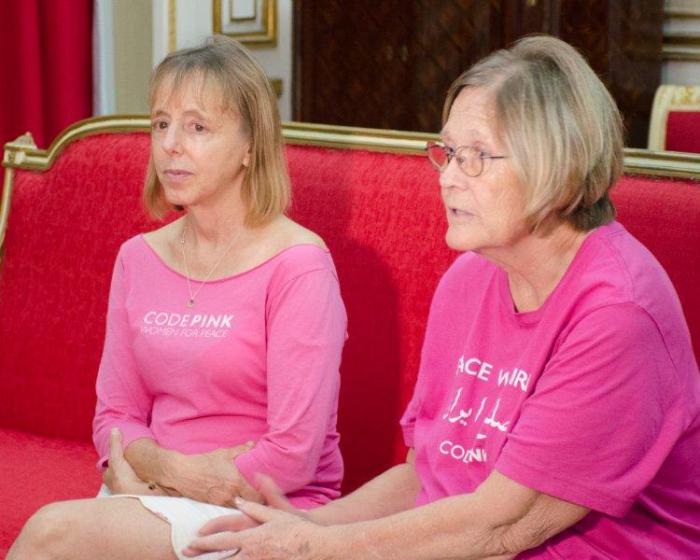
Pacifists Medea Benjamin (left) and Ann Wright are active in ending the blockade of Cuba and defending other just causes around the world. Photo: Orlando Perera
A delegation composed of more than 50 Americans and convened by the organization Code Pink, carried out an intense program of visits to the communities with the purpose of talking with the Cuban people.
One of the founders of the solidarity group, Medea Benjamin, said at the headquarters of the Cuban Institute of Friendship with the Peoples (ICAP) that she felt pain for the setback in bilateral relations between the United States and the island. She felt the same because of the actions of Donald Trump’s administration, mainly the intensification of the unjust blockade and the activation of Title III of the Helms-Burton Act.
“We are facing an economic war and it is being practiced against countries like Venezuela, Nicaragua, Iran, and others, which are not to the liking of the White House. This is a form of pressure from the Trump administration to change governments. That president must obey international laws and respect the sovereignty of the people,” warned the peace activist.
She called the foreign policy implemented by the current presidency in Washington dirty: “This is an election year. They (the right-wing) want to take over the majority of Florida’s votes. This is why they are taking measures that have nothing to do with the well-being of Cubans,” she said, mentioning the names of Congress members Marco Rubio and Mario Rafael Diaz Balart as the most sinister characters in this type of political game.
She said she was part of the group that occupied Venezuela’s diplomatic headquarters in the United States to save it from the representatives appointed by self-proclaimed President Juan Guaidó. “We stayed several weeks living inside the embassy, fighting against very aggressive people, mainly right-wing Venezuelans living in the U.S. We have been taken to jail, we have been threatened, but we remain firm in proclaiming that our government cannot recognize a president who has not been elected by the people. It cannot give a facility to people who have no real power to carry out consular procedures. Nor do they have the right to decide for the Venezuelan people and elect a president of their own choosing,” said Medea Benjamin.
Also, in the last few weeks, members of the Code Pink group have visited Bolivia, because it hurts them to see what is happening in that country, after a coup d’état carried out by fascists, who privatize resources and sell the people’s goods. “We must defend Evo Morales, because he has been the first indigenous president, a symbol not only for Bolivia, but for worthy people all over the world, including the United States,” said the human rights defender.
She stressed that the main task of the Code Pink group on this issue is to report on events and show evidence of the White House’s involvement in overthrowing legitimate Latin American governments. The organization was born on November 17, 2002, and works to end wars and occupations by the U.S. government, to challenge global militarism, and to redirect resources to finance arms and military supplies to health, education and employment programs.
With her came Ann Wright, a retired and ex-colonel and diplomat. She had been against the war in Iraq in 2001 and other wars sponsored by her country. Today she is a peace activist and speaks out against the foreign policy of the U.S. government.
She believes that the relationship with Cuba has changed for the worse, and said she is very concerned about the decisions of the Trump administration. “We’ve talked to many people in the communities and members of non-governmental organizations, also with the accountants about the impact of the sanctions on their lives. We feel a sense of sadness and ask the people of Cuba to forgive us for what our government is once again doing.”
Coronavirus…Biological Terrorism?

Coronavirus, Another Act of Biological Terrorism?
“Isn’t it highly suspicious that the coronavirus has appeared in China and that Washington has introduced it to weaken what many already consider the world’s leading economic power over the hitherto evil empire led by Trump?”
—————————————————————————————-
Author: Orfilio Peláez | orfilio@granma.cu
February 7, 2020 23:02:34
Translated and edited by Walter Lippmann for CubaNews.

China faces the coronavirus responsibly and with its people., In the image the first hospital to care for the sick, built in just ten days, and the second hospital is already delivered for the same purpose. Photo: XINHUA
An article published in his personal blog by Spanish journalist Patricio Montesinos deals with the theory that the coronavirus could be a germ created in U.S. laboratories, as a bacteriological weapon of the commercial war unleashed by Washington against China.
According to the text reproduced in Rebelión, several recent statements by senior White House officials and an increasingly intense international media campaign against China, feed the hypothesis that the administration of President Donald Trump could be responsible for the epidemic that appeared in late December 2019, in the city of Wuhan.
Montesinos alludes to the January 31 statement by Commerce Secretary Wilbur Ross, who said, “The coronavirus outbreak that has infected thousands of people could boost the U.S. economy. But the senior official went further, saying that it “will help speed the return of jobs to America.
Ross’s statements followed those of Secretary of State Mike Pompeo, who in the midst of the world’s emergency for the disease identified China as a threat to international democratic principles.
In addition, the silence of the major media omits to mention the enormous efforts made by the Asian country’s authorities to control the spread of the epidemic. These include the construction, in record time, of two major hospitals to provide top-quality medical care to the sick and the search for effective drugs that can cure the disease.
In his article, the journalist states that although there have been attempts to hide it, the world knows well how successive U.S. administrations have resorted to biological warfare to overthrow governments considered to be adverse, and to unleash conflicts between nations and exterminate populations.
Fidel, one of the first targets
A look at what has happened in the world during the last 60 years allows us to say that few nations have suffered such varied forms of biological attacks as Cuba.
Perhaps one of the first alleged victims of that dark form of aggression was Commander-in-Chief Fidel Castro at the beginning of the Revolution. The Central Intelligence Agency (CIA) designed a plan to contaminate a diving suit that was supposed to be used by the Cuban leader.
Carefully infected with tuberculosis bacilli, the CIA wanted to use Fidel’s hospitality with James Donovan, a lawyer who was negotiating with the Cuban government to free the mercenaries captured in the invasion of Playa Giron, to deliver the suit to the Chief of the Revolution through him.
The macabre gift was not given by Donovan to his host and the versions that have come down to us suggest that he refused or sought a pretext to avoid becoming involved in the infamous act.
There were also attempts to inoculate microorganisms in tobacco that Fidel would smoke, in order to cause his emblematic beard to fall out.
After the failure of the invasion of Playa Girón, in 1962 the CIA, with the approval of the U.S. government, implemented the so-called Operation Mongoose. Included among its actions was the use of biological and chemical agents capable of destroying Cuban crops and incapacitating agricultural workers.
It was not by chance then that shortly afterward the pathogenic New Castle virus appeared in the fields of the largest of the Antilles and caused severe damage to the national poultry population by having to slaughter tens of thousands of birds.
According to what William Turner, former FBI agent, and the journalist Warren Hinckle, as stated in the book Lethal Secrets: The War of the CIA and the American Mafia against Fidel Castro and the assassination of John Fitzgerald Kennedy, the United States used bacteriological warfare in Cuba during the administration of Richard Nixon (1969-1974) and the CIA engaged the northern government in an undeclared and illegal secret war against Cuba. An example of this was the sudden emergence and rapid spread in 1971 of the first epidemic of African swine fever, whose control and eradication led to the elimination of more than half a million pigs.
On January 7, 1977, a cable from the U.S. agency UPI, dated in Washington, reported that an unidentified CIA source revealed that it had received a container containing the virus in early 1971 at Fort Guglick, a U.S. Army base in the Panama Canal zone. It was to be transferred in a fishing boat to agents in charge of operating clandestinely in Cuba.
Following the investigations made by a group of scientists of the National Center of Agricultural Health (Censa), directed by Dr. Rosa Elena Simeón Negrín, it was concluded that this specific germ of the pigs had been artificially adapted to be transported by means of birds. The specialists warned that this could only be achieved intentionally and with refined techniques of genetic engineering and biotechnology.
It was the first time that the aggressive disease had spread in the Western Hemisphere.
African swine fever reappeared in Cuba in 1979. On that occasion, it became known that the reinfection originated in the surroundings of the town of Caimanera, very close to the Naval Base, which illegally occupies Cuban territory in Guantánamo.
Other acts of bacteriological warfare suffered by the Cuban people between the 1970s and the 1990s. These included the deliberate introduction of the Blue Mould of tobacco (1971), which severely affected the production of such an important exportable product, Cane Rust (1978), whose devastating effect forced the dismantling of almost all the fields planted with the Barbados 4326 cane variety, which has high agricultural and industrial yields. Finally, the painful epidemic of dengue hemorrhagic fever (1981), which caused 158 deaths, 101 of them children, and the insect infestation Thrips palmer which devastated several crops.
During a trial held in New York City in 1984, the Cuban-born agent of the CIA Eduardo Arocena, declared in no uncertain terms that the mission of the group under his command was to obtain certain pathogenic germs and introduce them into Cuba.
The confession is recorded in the minutes on page 2189, file 2-fbi-ny 185-1009, but the prosecutor in charge of the process never ordered an investigation.
There is no evidence at this time that the coronavirus is part of a biological terrorist action by the United States, but the practice of that country and the statements of some of its highest officials leads journalist Patricio Montesinos in his thoughtful article to ask himself: “Isn’t it very suspicious that the coronavirus has appeared in China and that Washington has introduced it to weaken what many already consider the first economic power in the world, over and above the until now evil empire led by Trump?
In context
More than 31,400 cases of coronavirus infection exist worldwide, according to a report yesterday from the World Health Organization (WHO), and of those more than 31,200 in China.
The outbreak is now in 25 countries and 638 people have died, of which only one was recorded outside the Asian giant.
No Latin American country is yet on the map of coronavirus distribution drawn up by the WHO, although an Argentine citizen traveling on a cruise ship held in Japan was found to be infected.
So far, Chinese doctors have saved 1,540 people, according to a report by the People’s Daily.
The People’s Daily reported that Chinese President Xi Jinping spoke by phone Friday with his U.S. counterpart, Donald Trump, asking for sanity in the international media atmosphere. Figures and data are deliberately presented there without contrast, which convey an image that the Asian nation is not doing enough to counteract the epidemic.
During the 146th session of the WHO Executive Board on February 4, Director-General Tedros Adhanom Ghebreyesus praised China for its strong action and speed in the fight.
The Isolated Superpower
The Isolated Superpower

By Manuel E. Yepe
http://manuelyepe.wordpress.com/
Exclusive for the daily POR ESTO! of Merida, Mexico.
Translated and edited by Walter Lippmann.
On March 12, 1996, the Congress of the United States of America approved one of the most regressive and draconian imperialist foreign policy initiatives, ironically named the Solidarity Act of Freedom and Democracy for Cuba (LIBERTAD), known as the Helms-Burton Act.
Before the triumph of Cuban guerrilla weapons over the armed forces of Fulgencio Batista’s tyranny, which had been imposed by Washington on Cuba, the United States exercised absolute control. The economy of the island was ultimately subordinated to the interests of U.S. companies involved in relations with the Cuban authorities and entities.
After the victory of the revolution in January 1959, the situation changed completely. Cubans became masters of their country and their economy. Nevertheless, Cuba could not conduct its normal foreign trade relations with the US because US hostility became present in economic relations.
However, before the 1990s, the blockade on trade with Cuba had not been legally established although it started working through so-called “executive orders”.
It was President Kennedy who officially initiated the blockade, euphemistically called the “embargo”, in 1962. He did this on the basis of [U.S. national] self-interest in response to the nationalization of US assets ordered by Cuba following the revolution’s coming to power.
Happily for Cuba, that moment arrived just at the moment when Moscow was in a position to become Cuba’s main trading partner in the New World. There were special incentives from its ideological affinity and a certain economic complementarity that the political alliance would bring about.
It is rightly said that the community’s approach and world public opinion have very little influence on the policy of the United States of America. This perception was fully confirmed by history during the second half of the 20th century.
Every year, Cubans, many Latin Americans and not a few Americans, humiliated by the shame of the criminal economic, commercial and financial blockade that their country, the richest and most militarily powerful in the world, has been exercising against this small island. Cuba is a giant in terms of dignity,
The sole justification of Washington’s fear is that the example of Cuba’s successful resistance to unjust abuse will encourage other peoples and governments of the continent to defend their sovereignty, which cannot be renounced.
Once again this year, the most representative body of the international community debated and approved almost unanimously, in a plenary session of its General Assembly, the resolution “Necessity of ending the economic, commercial and financial embargo imposed by the United States on Cuba”.
A few minutes after the conclusion of this most recent session of the UN General Assembly, the whole of Cuba celebrated, as it does every year, “the new victory against imperialism” with as much joy as if it were the first time that it did so as an expression of its condemnation of the unjust blockade imposed on the Caribbean country.
This was the umpteenth time in as many consecutive years that the United Nations General Assembly approved the same resolution. It calls for the suspension of the longest blockade in human history. It has already caused the island more than $100 billion in losses. It could have served to bring Cuba out of underdevelopment through its own efforts, according to the original projects of the triumphant revolution in January 1959.
The Helms-Burton Act was not the only piece of explicitly anti-Cuban legislation circulating in Congress at the time. On February 9, 1995, Representative Charles Rangel (D-NY) introduced a bill with a diametrically opposed text, the Cuba Free Trade Act. It was aimed at eliminating the blockade and establishing a dialogue with Cuba. In doing so, Rangel sought to draft an agreement on the disposition of expropriated U.S. assets in Cuba.
Congress did not approve that law, opting for a hard-line stance against Cuba and avoiding constructive policies that would transform it.
December 27, 2019
Subscribe to Blog via Email
| M | T | W | T | F | S | S |
|---|---|---|---|---|---|---|
| 1 | ||||||
| 2 | 3 | 4 | 5 | 6 | 7 | 8 |
| 9 | 10 | 11 | 12 | 13 | 14 | 15 |
| 16 | 17 | 18 | 19 | 20 | 21 | 22 |
| 23 | 24 | 25 | 26 | 27 | 28 | |


You must be logged in to post a comment.